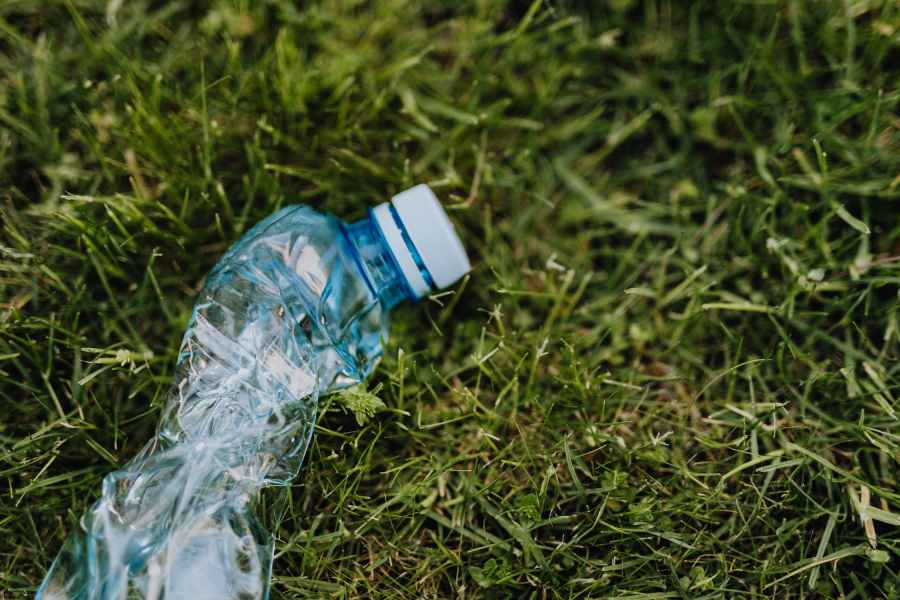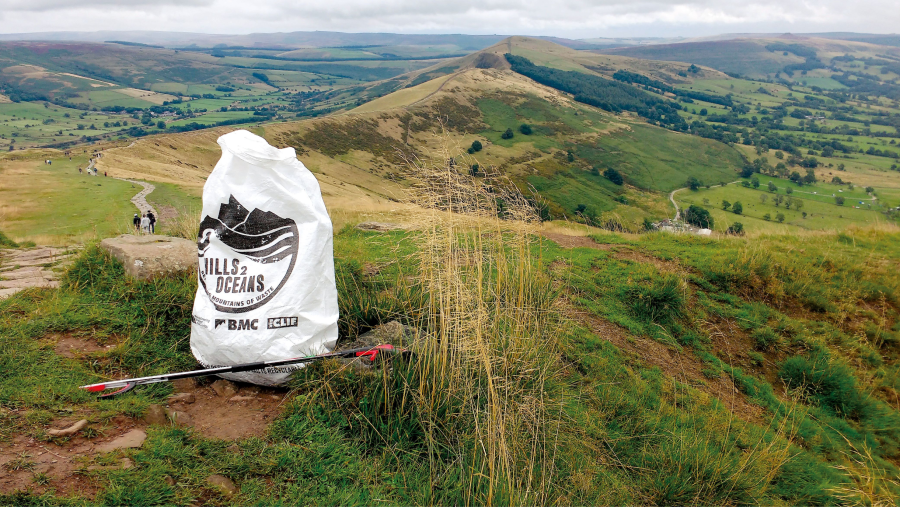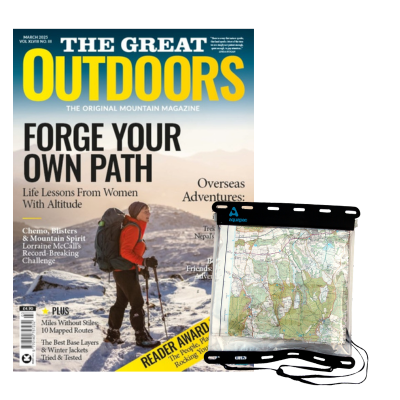We all need to actively care for our wild places, not simply ‘Leave No Trace’, argues Mary-Ann Ochota.
A number of years ago I learned that when experienced hill people see a scrap of litter on the trail, they stop, pick it up, squish it into a rucksack side pocket and carry on. I’ve seen instructors do it, guides do it, teens on trail runs do it. From them, I learned that I should do it too. It makes us custodians of the great outdoors, not just ‘users’.
Words: Mary-Ann Ochota | Main image: H2O Litter Pick on Mam Tor. Credit: Peter Judd.
I was reminded of this the other day when I interviewed explorer and Scouts ambassador Dwayne Fields for the British Mountaineering Council’s ‘Finding Our Way’ podcast. He was fizzing with passion, advocating for opportunity and education – so that youngsters can explore the wild, and do it responsibly.
He told me, “every single time I go out I guarantee you I’ll come back with a pocket full of rubbish. I don’t see who drops it, I don’t care who drops it, I wish they wouldn’t…[but] if you know not to do it, it’s your responsibility to educate somebody else, even if it’s just one person. So don’t get upset if you see rubbish dropped and you haven’t done anything to try and prevent it.”
I liked the challenge – that not clearing rubbish from wild places is to fail. Every walk must be seized as a chance to show those you’re with that this is what we do: We don’t drop, we do pick up.
Care and connection
I always thought picking up other people’s rubbish would annoy me, force me to focus on the negative – selfish behaviour, dirty habits, the harmful pollution – all the things that were a risk to nature and the landscape I was there to enjoy. But it turns out that there’s great joy to be had in picking up crisp packets and dog poo bags and discarded energy gels.
Of course, I’d rather they weren’t there. But given that they are, as soon as you start picking up litter, your adventure goes from being positive for you to becoming positive for nature and our wider community too. It becomes an act of care, and connection.

A discarded plastic water bottle.
Credit: Karolina Grabowska
Every piece of single-use plastic not on a hillside, verge or in a beck is a piece that won’t find its way into the sea. It won’t degrade into tiny pieces and pollute an already vulnerable landscape and its animal and plant inhabitants. It won’t be there, proclaiming to others, ‘this is normal, everyone chucks their wrappers on the ground’. And crikey, if someone spots you in the act of picking up rubbish, it becomes even more powerful. You don’t need to say a word – your actions proclaim, ‘this is normal, everyone clears up rubbish from the ground’. Leave No Trace becomes Leave A Positive Trace.
Since discovering the wonder of litter picking, I’ve invested in a Litter Picker Pro (you can buy one from the British Mountaineering Council online for £18 (£16 for members) and support their Hills 2 Oceans plastic pollution campaign at the same time). It’s a game-changer. No more cheapo grabbers that aren’t strong enough to pick up a glass bottle, or reach a packet under the hedge. This one is hungry for the hunt. It’s pro. It also folds, so can fit nicely next to your walking poles or under your arm on a local stroll.
Dump the word
Now we’ve agreed that litter picking is what we do (and I’ve helpfully given you an idea for your next birthday pressie – you’re welcome), here’s a curve ball – the organisation Trash Free Trails thinks we should dump the word ‘litter’. They talk about ‘single-use pollution’ instead.
Why? Well, they argue that ‘litter’ masks the real issue – that throwaway, value-less packaging has been normalised, and that the responsibility for dealing with it ‘responsibly’ has been placed on us, the end users, rather than the businesses that created it in the first place. ‘Litter’ is the fault of litterbugs and tossers. ‘Single-use pollution’ refocuses on the responsibilities of the mega-corp producers and narrowly profit-obsessed business models built on environmental harm.
It’s not just plastic that’s the problem – single-use anything is unsustainable. We can’t recycle our way out of this mess. They have to stop producing the stuff in the first place, which is mostly contingent on us deciding to stop consuming the stuff in the first place, and shifting what the norms of packaging are.
Whether it’s plastic tags on new kit, the fancy paper bag from a bakery, or a flapjack wrapper blowing across Kinder plateau – extinguishing the existence of this pollution in the first place is the most radical act of care we can lobby for. In the meantime, there’s the Litter Picker Pro.
Mary-Ann is a broadcaster, anthropologist and keen hillwalker. She’s the hillwalking ambassador for the British Mountaineering Council, a trustee for the John Muir Trust and a fellow of the Royal Geographical Society. These are her personal opinions. Find her on Instagram and Twitter.







